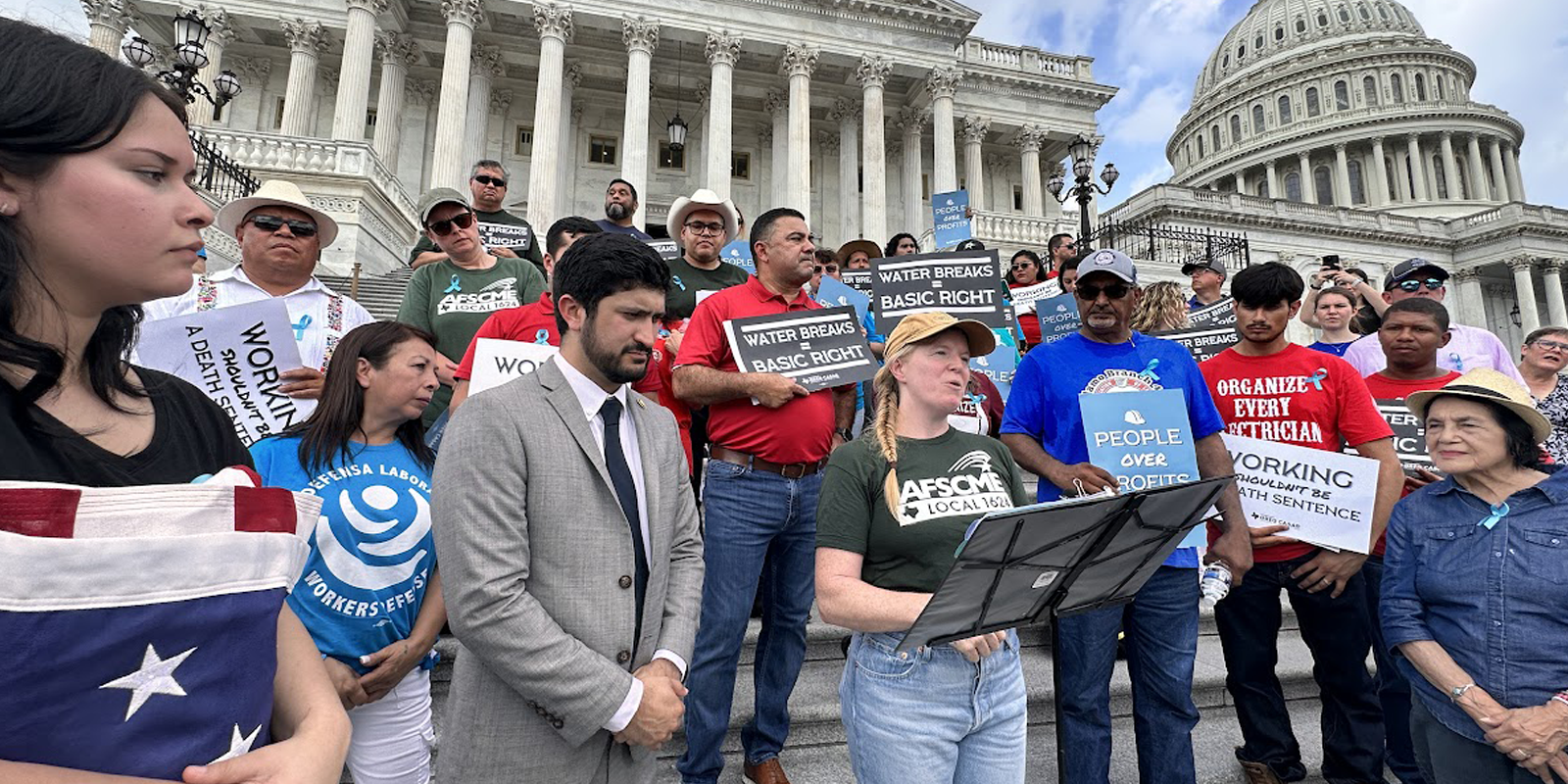A new law in Texas – a state that’s experiencing one of its hottest summers on record – will soon make it illegal for cities and counties to mandate breaks and other protections for workers, including water breaks for construction workers.
The so-called the “Death Star bill” is bound to have deadly consequences. This year alone, a U.S. Postal Service employee in Dallas died while on his route in 115-degree heat and a lineman restoring power in Harrison County, Texas, likely died from heat exhaustion, according to a letter from members of Congress to Biden administration officials.
That’s why AFSCME Local 1624 members flew from Texas to Washington to join an all-day vigil and thirst strike on the steps of the U.S. Capitol Tuesday. They supported Texas Rep. Greg Casar (D-Texas), an AFSCME member, as he went without food or water throughout the day and stood outside in the sun to protest the law’s cruelty.
AFSCME members demanded speedy federal action to protect workers from deadly heat. They called on the U.S. Occupational Safety and Health Administration (OSHA), the federal agency in charge of protecting workers on the job, to move more quickly to issue a workplace heat standard that includes rest and water breaks. They also called on Congress to pass a law to expedite an OSHA heat standard.
“Working shouldn’t be a death sentence,” said Ben Suddaby, an operations specialist for Travis County, Texas, and president of Local 1624. “Without water there is no life, and without workers nothing gets done. … We need federal protections now.”
Members of Local 1624 work for the City of Austin and Travis County. In addition to Suddaby, those who flew to Washington included City of Austin employees Sarah Campbell, an arborist, and Tony Ponder, an airport agent. In addition to supporting Casar’s strike, they also met with staff for the Senate’s Health, Education, Labor and Pensions (HELP) Committee, chaired by Sen. Bernie Sanders (D-Vt.), and staff for the House Education and Workforce Committee to advocate for federal heat standards.
AFSCME President Lee Saunders stopped by the thirst strike in a show of support, as did several members of Congress, including House Minority Leader Hakeem Jeffries (D-N.Y.), Rep. Katie Porter (D-Calif.), Rep. Ro Khanna (D-Calif.), Rep. Sylvia Garcia (D-Texas), Rep. Al Green (D-Texas), Rep. Joaquin Castro (D-Texas), and more.
Others who supported Casar included Jasmine Granillo, the sister of Roendy Granillo, a 25-year-old construction worker who died from heat stroke in Dallas in 2015 after being denied a water break, and legendary labor leader and civil rights activist Dolores Huerta, who demanded an end to Gov. Greg Abbott’s “fascist policies against the people of Texas.”
“Cruel,” “barbaric” and “inhumane” were a few of the words critics used to describe the Death Star bill (Texas House Bill 2127), which goes into effect Sept. 1. The law bars cities and counties from passing regulations and overturns existing ones that go beyond state law in areas such as labor and agriculture. Because there is no state law in Texas that protects workers from exposure to extreme heat without water breaks, city ordinances that do so will become illegal.
In 2010, Casar was an activist in his early 20s when he participated in a thirst strike at Austin City Hall to call for rest and water break protections. The city approved such protections later that year. City ordinances that do the same in Dallas and San Antonio will soon be preempted unless the Biden administration acts.
“In the hottest month in Texas history, supposed leaders entrusted by us to do right by us … stripped workers of the right to take a water break,” Casar said Tuesday. “What they’re not counting on is that they’re not going to stop us. Today we’re here to show them that they’ll never shut down the movement of workers.”
